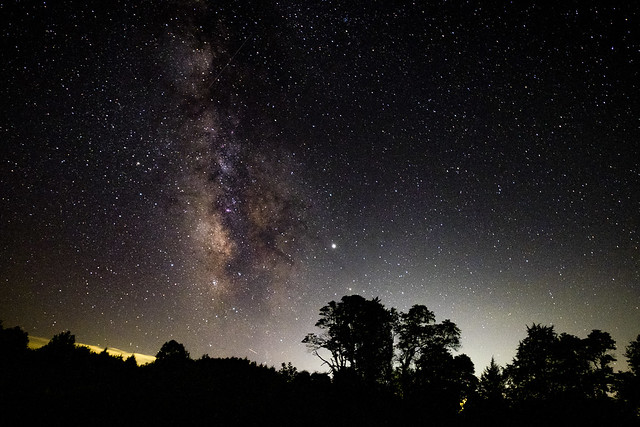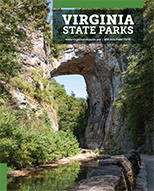Due to the expected impact of the winter storm, all Virginia State Park overnight facilities will be closed from Friday, Jan. 23 through Sunday, Jan. 25. This decision is based on the forecast for unsafe conditions and potential power outages. For updates click here.
Read Our Blogs
Protecting Virginia's Dark Sky Parks from light pollution

James River State Park
Virginia is home to five International Dark Sky Parks, four of which are state parks. James River, Natural Bridge, Sky Meadows and Staunton River state parks earned their designations from DarkSky International for their exceptional quality of starry nights and commitment to preserving natural darkness.
However, light pollution is a growing concern for these parks, as it’s diminishing their pristine nightscapes. Excessive artificial lighting from nearby towns and cities creates a glow, which affects more than just the stargazing experience.
Keep reading to learn more about light pollution and the steps you can take to help reduce it.
Understanding light pollution's impact

Natural Bridge State Park
Light pollution refers to excessive, misdirected or artificial light that obscures natural darkness. Its impact is bigger than you might think. Here’s what light pollution can do:
- Disrupt ecosystems: Artificial light interferes with natural cycles, particularly affecting nocturnal animals. For example, it can disorient migrating birds, disturb insect populations and alter predator-prey relationships.
- Reduce night sky visibility: Excessive artificial light scatters in the atmosphere, limiting the visibility of stars, planets and meteor showers.
- Impact on human health: Overexposure to artificial light can interfere with sleep cycles and circadian rhythms.
- Waste energy: Poorly directed or excessive lighting wastes energy and increases costs for municipalities, businesses and homeowners.
Tips for reducing light pollution in your community

Staunton River State Park | Photo courtesy of Jonathan Piques
You can help reduce light pollution by making a few simple changes.
Install shielded fixtures: Use fully shielded outdoor lights that direct illumination downward to reduce skyglow.
Switch to warm LED lights: Choose LED bulbs with a color temperature of 3000K or lower, which emit less blue light and minimize glare.
Use motion sensors and timers: Limiting when lights are on ensures they serve their purpose without unnecessary waste.
Advocate for Dark Sky ordinances: Encourage local governments to adopt lighting regulations that prioritize dark-sky-friendly practices.
Educate your neighbors: Organize or participate in community events to promote awareness of light pollution's effects.
Visiting and supporting Virginia's Dark Sky Parks

Sky Meadows State Park
When visiting a Dark Sky Park, follow these steps to help minimize your light pollution impact and preserve the night sky for everyone:
- Use red or amber lights: Use a flashlight or headlamp with a red or amber filter. These colors are less disruptive to night vision and wildlife.
- Keep lights low and pointed down: If you have to use light, point it downward and keep it shielded to reduce glare and sky glow.
- Minimize light use: Only turn on lights when necessary and switch them off as soon as you're done.
- Avoid bright screens: Dim your phone or camera screen to reduce ambient light.
- Park strategically: If driving, avoid parking in areas where headlights may disturb stargazers.
By taking these simple steps, you can help protect the pristine night skies that Dark Sky Parks are dedicated to preserving.
To learn more about Virginia State Parks’ International Dark Sky Parks, go to virginiastateparks.gov/dark-sky-parks. For more information about DarkSky International, including downloadable educational materials, visit darksky.org.
If you have read the article and have a question, please email nancy.heltman@dcr.virginia.gov.
Search for blogs
By Park
Categories
Cabins
Camping
Fishing
History and Culture
Other
Programs and Events
Trails
Volunteers
Water Fun
Archive
2026
2025
2024
2023
2022
2021
2020
2019
2018
2017
2016
2015
2014
2012













